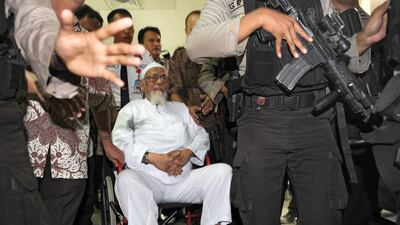A radical cleric linked to the deadly 2002 Bali bombings will be released from prison this week, Indonesian authorities said on Monday, after an earlier bid to free him early was reversed following a public uproar.
Abu Bakar Bashir, 82, once synonymous with extremism in the world's biggest Muslim-majority nation, will be freed on Friday after completing a 15-year prison term for helping fund paramilitary training in conservative Aceh province.
He was sentenced in 2011, but the firebrand preacher's time was cut due to regular sentence reductions handed to most prisoners in Indonesia.
"He will be released on January 8, 2021, as his prison term expired and ended," Rika Aprianti, spokesman for Indonesia's corrections agency, said.
Bashir's lawyers had appealed for early release citing his old age and risk of contracting Covid-19 in the South-East Asian nation's overcrowded prison system.
Bashir, a key figure in militant group Jemaah Islamiyah, was previously jailed over the Bali bombings, but that conviction was quashed on appeal.
He has repeatedly denied involvement in the 2002 bombings that killed more than 200 people in Indonesia's worst terror attack. Most of the victims were foreign tourists, including dozens of Australians.
Two years ago, plans to grant Bashir early release on humanitarian grounds were shelved after a backlash in Indonesia and Australia.
Bashir has since been regularly taken to hospital over his deteriorating health.
The Bali bombings prompted Jakarta to increase its counter-terror co-operation with the US and Australia.
Al Qaeda-linked JI was founded by a handful of exiled Indonesian militants in Malaysia in the 1980s and grew to include cells across South-East Asia.
As well as the Bali bombings, the radical group was blamed for a 2003 car bomb at the JW Marriott hotel in Jakarta and a suicide car bomb the following year outside the Australian embassy.
This week Indonesian police said they had discovered videos showing members of JI at what they described as terrorist training camps.
The dramatic footage, including kidnapping and weapons simulations, was found on the laptop of a recently arrested terror suspect, they said.

